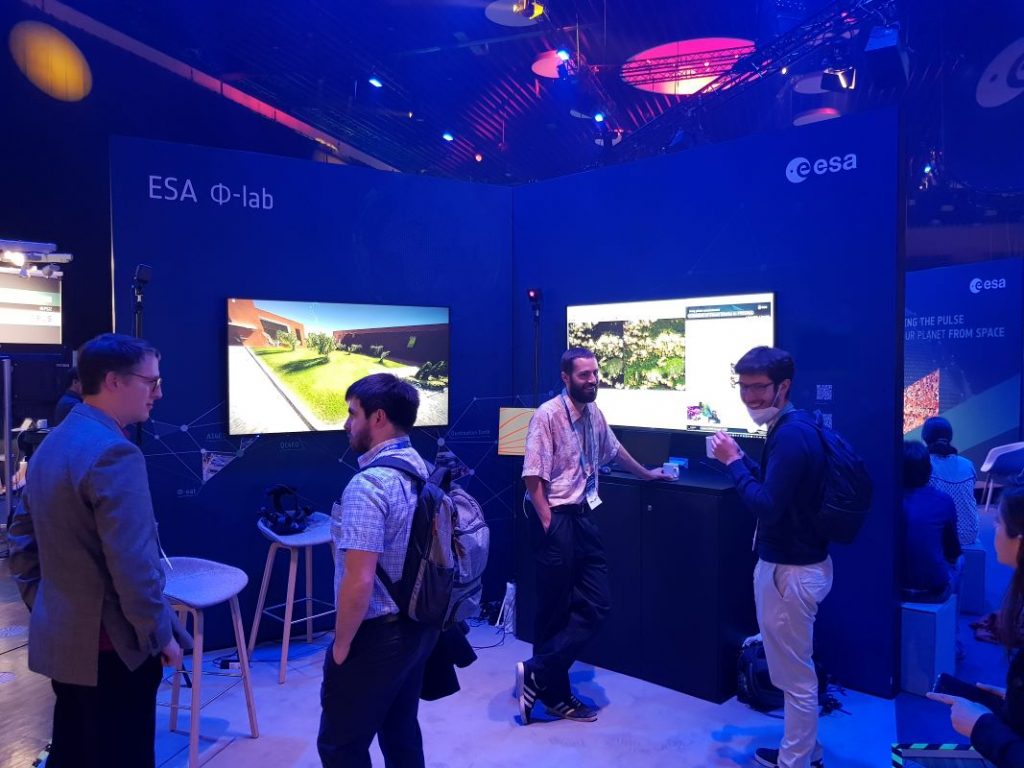LPS22: Φ-lab shows how new digital tech and computing paradigms will reshape EO
With its themes of emerging technologies and the competitive business sector in Earth observation (EO), this year’s Living Planet Symposium (LPS22) championed topics that are fundamental to the mission of ESA Φ-lab. Indeed both the Explore and Invest offices of Φ-lab made major contributions to the event in areas such as Artificial Intelligence for Earth observation (AI4EO), Virtual Reality (VR), New-Space missions and quantum and neuromorphic computing.
“ESA Φ-lab’s defining mantra of transformative innovation in Earth observation, from idea creation through to supporting leading-edge product and service development up to market adoption, has allowed us to play a significant role at the 2022 Living Planet Symposium. Through presentations, discussions and practical demonstrations, our researchers and business innovators have provided a comprehensive view of disruptive activities in EO in both the institutional and commercial sectors.” – Giuseppe Borghi, Head of Φ-lab.
As one of the largest Earth observation conferences in the world, ESA’s Living Planet Symposium is a critically important forum for understanding our environment and climate. The 2022 edition was held last week at the World Conference Center in Bonn, and one of its central topics dealt with Enabling the Earth Observation digital transformation using emerging technologies, AI and data analytics to create new opportunities across the entire sector.
ESA Φ-lab was well represented at the event with a very broad range of offerings, including two sessions dedicated to showcasing the wealth of activities covered by the ESA InCubed Programme. In one of the Agora interactive forums, an overview of InCubed was presented within the context of the EO commercial sector as a whole and the forthcoming ESA Ministerial Council (CMIN22). There were also examples of current initiatives and strategic partnerships that Φ-lab is either developing or has put in place to support innovation and investment, such as the recently announced free cloud services from partner OVHcloud. The second session gave a detailed view of several commercial EO satellite missions that are benefitting from InCubed co-funding.
A key area of innovation and cutting-edge research within Φ-lab is the future of computing for EO, and the subject featured in sessions chaired or co-chaired by Φ-lab researchers. In ‘AI@edge and Emerging Computing Paradigms for the Future of Earth Observation’, speakers presented research in a field which offers both significant computational opportunities and some daunting challenges. Andrzej Kucik was one of the session’s conveners: “With talks from both industry and academia, this session revealed the state of the art in deploying AI models at the ultimate edge – space. We also had a demonstration by IniVation of their neuromorphic event camera, which is inspired by biological retinas and has enormous potential for high-resolution, power-efficient sensing.” The discussion on neuromorphic algorithms continued in a subsequent Agora session co-hosted by Gabriele Meoni, where participants made some fascinating contributions on other technologies that are revolutionising information processing, including quantum, distributed and hybrid computing.

Attendees were particularly keen to see Φ-lab’s sensor-derived virtual reality simulations. Located in the ESA exhibition booth, the VR demonstration was run by the Explore Office and based around two research initiatives. In one experience, users explored a virtual 3D model of the Earth through the VR headset and were able to overlay and analyse various EO datasets as they swept across the surface of the planet.
A second headset was on hand displaying the first prototype of a digital twin of ESRIN (the ESA establishment that is home to Φ-lab). “Digital Twin ESRIN is a complete 3D reconstruction of our site, created from drone imagery in combination with in-situ data from vegetation health and air quality sensors,” explained Head of the Explore Office Pierre Philippe Mathieu. “This simulation aims to provide a live twin of a geographical area in order to enable real-time quantification of our environment and its evolution, all delivered within a high-impact VR experience.”
Φ-lab’s presence was also highly evident in a number of other gatherings at LPS22. Division head Giuseppe Borghi discussed transformative innovation at the Digital Copernicus session, promoting its role in generating a unique competitive advantage in the European EO ecosystem. Following on from her team’s UNESCO-award-winning research on dengue fever monitoring, Rochelle Schneider dos Santos was well placed to co-host the ‘Earth Observation for Health’ session, but also facilitated a forum for young scientists called ‘Meet the Next GenEO’. Nicolas Longépé helped organise three sessions on super-resolution methods and SAR data analytics, and many other Φ-researchers shared results and ideas in discussions and on poster boards throughout the week.
The plenaries of LPS22, including ‘Future EO’ and ‘New Space & EO (Commercial Markets)’, are all available for streaming here.
To know more: Living Planet Symposium, ESA Φ-lab, Φ-lab Explore Office, ESA InCubed Programme
Main photo courtesy of ESA/JürgenMai
